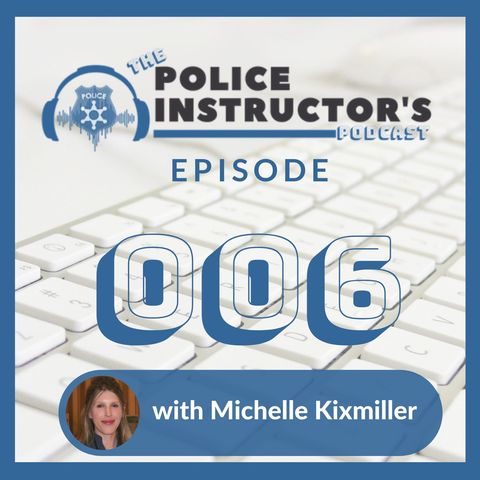PTSD: It has nothing to do with how strong someone is... with Michelle Kixmiller

Descarga y escucha en cualquier lugar
Descarga tus episodios favoritos y disfrútalos, ¡dondequiera que estés! Regístrate o inicia sesión ahora para acceder a la escucha sin conexión.
Descripción
Hey everyone… Michael Simpkins here, welcome to Episode 6 of The Police Instructor’s Podcast… thank you for joining me today… I appreciate you taking the time to listen. In this...
mostra másIn this episode I’m speaking with Michelle Kixmiller about PTSD in law enforcement… she’s going to share strategies that may help us recognize it and overcome it…
Michelle Kixmiller is a Psychiatric Mental Health Nurse Practitioner and Licensed Educator. She works with adults and children with mental health needs including post-traumatic stress disorder, depression, anxiety, bipolar disorder, schizophrenia, trauma recovery, and substance use disorders. Michelle currently works full time for a non-profit community mental health center and serves as nursing clinical instructor for Belmont University. Prior to her current position she has worked as both a critical care burn nurse at Vanderbilt Medical Center and as a medical-surgical nurse.
Having lost her younger brother after a long battle with depression and alcoholism, Michelle is dedicated to erasing the stigma surrounding the topic of mental health that prevents individuals from getting the care they need. She speaks on topics such as mental health wellness, creating mentally healthy environments, and really just any and all things mental health.
For any of you listening today who may be struggling with PTSD or more, know you’re not alone. Pay attention to this episode, listen all the way through, because Michelle has a wealth of knowledge to share about PTSD and mental wellness.
Thank you for being here with me today Michelle, I’m excited you’re here, welcome to the Police Instructor’s Podcast.
What You’ll Learn in this Episode:
1.Overview of PTSD (causes, signs and symptoms to look for outside of the stereotype)
2.Stress Continuum Model that can be used as a guide for early intervention: Click the following link to see the stress continuum model: https://www.dropbox.com/s/z2nzksqnmn4977s/PoliceStressFirstAid.pdf?dl=0
3.First steps and finding the intervention that is right for you.
4.Importance of having resources readily available and easily accessible that can be accessed without fear of repercussion in regard to work and with maintained confidentiality.
Información
| Autor | Michael Simpkins |
| Organización | Michael Simpkins |
| Página web | - |
| Etiquetas |
Copyright 2024 - Spreaker Inc. an iHeartMedia Company

Comentarios